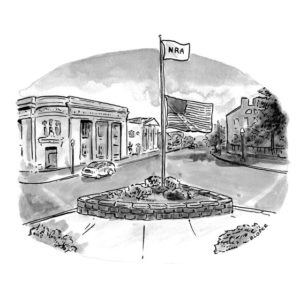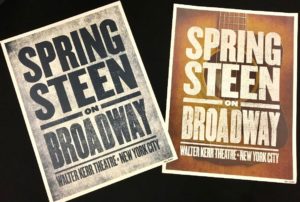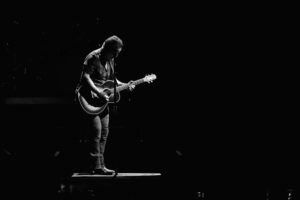Bruce.
On Broadway, Springsteen Channels His Inner Springsteen
Springsteen has said that the show was inspired by an acoustic concert he performed in the East Room of the White House in late 2016, for around two hundred and fifty people, an earnest parting gift to the Obama family. The night was heavy on storytelling, which loosely mirrored the chronology of his memoir, itself a kind of ur-American story—a rise from nothing to very, very much. In the nineteen-seventies, at the birth of his career, Springsteen often performed with the E Street Band at small night clubs (such as the Bottom Line, then on West Fourth Street, or the Stone Pony, in Asbury Park, New Jersey), bolstering those concerts with gripping and colorful yarns that drew on memories of his childhood along the Jersey Shore—his parents, his home town, old loves.
[…]
Springsteen has described “Springsteen on Broadway” as “a solidified piece of work,” a show in the old-fashioned sense. It is performed on piano, guitar, and harmonica, and Springsteen—arguably one of the most energetic and effective bandleaders in all of rock and roll—is alone, save for a glass of ice water and a brief appearance by his wife and musical partner, Patti Scialfa…
[…]
Our reactions to political commentaries are often cerebral—we argue, we grasp for evidence, we espouse, we agree, we get angry. He’s trying, instead, to reach the parts of us that are not so close. Springsteen’s mission has always been to be a useful conduit—to reflect or articulate something back at us. But he is a model, too, and “Springsteen on Broadway” contains suggestions on how to age: admit your flaws and inconsistencies, your put-ons, your masks, your fears and humiliations. Make room for them. Find freedom in the revelation. Let it lead to more art.
Samantha Bee
Startling and revealing. Bee continues her investigative reporting, this time with a focus on the ease of US election hacking, brilliantly framed in satire and humor.
Last week, we learned that Georgia officials destroyed election data in the midst of a lawsuit alleging that they had ignored warnings that the state’s electoral system was vulnerable to hackers. In light of this new information, Samantha Bee dedicated a segment of Full Frontal to election hacking—and bumped up the production value in the process. Bee partied like it was 1999 by making the entire segment a not-very-timely Matrix parody, assuming a vaguely Neo-like role to learn more about potential foreign interference in U.S. elections.


